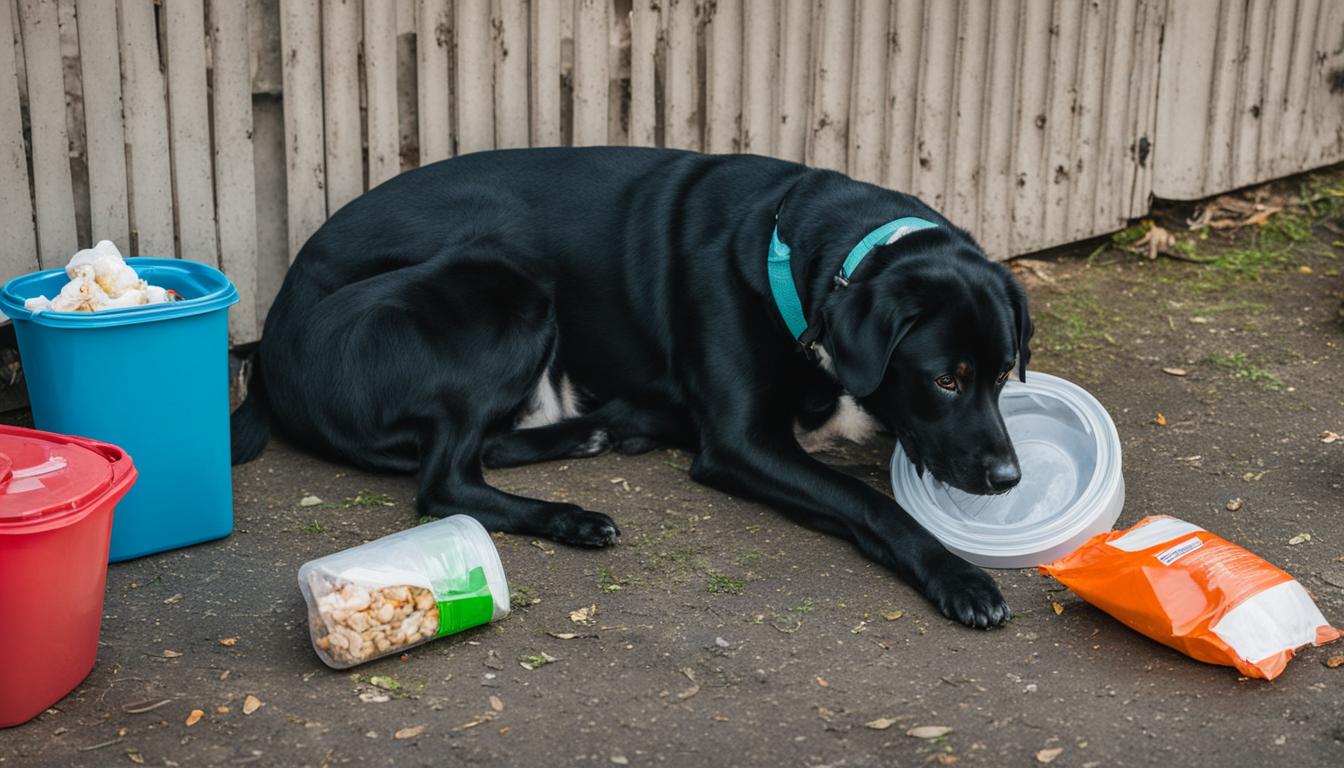Have you ever had a time when your stomach didn’t feel great, and it seemed like you just had to stay near the bathroom all day? That’s what people call a ‘stomach flu,’ and it’s no fun at all. Now, you might look at your dog and wonder, “Can my furry friend get this from me?” It’s a good question! While your dog can’t catch a cold from you, it’s a bit different when it comes to tummy troubles like canine gastroenteritis.
Some smart people did studies and found out something interesting. When people have the stomach flu, sometimes their dog might get sick with something that looks a lot like it. Norovirus is a name you might hear; it’s a bug that can make both humans and dogs feel pretty bad. So, if you’re not feeling great, it’s a good idea to keep things clean so your dog stays happy and healthy.
Pet health is super important, and knowing if our bugs can jump to our dogs is part of taking care of them. If your pup seems to have a sad tummy, it might not always be because of you. They could have eaten something funny or caught a different bug. But if you and your pet are both feeling sick, it’s smart to tell your vet. They can help figure out what’s going on.
Key Takeaways
- People’s ‘stomach flu’ can sometimes affect dogs, too.
- Canine gastroenteritis can make dogs’ stomachs hurt and cause other troubles.
- Cleaning a lot and being neat can help stop your dog from getting sick.
- Keep an eye on your pup’s tummy health, especially if you’re not feeling well.
- The norovirus isn’t picky and can spread to pets in the same home.
- If your dog’s unhappy, your vet can help make them better.
Introduction to Canine Gastroenteritis and Human Transmission
Imagine your tummy hurting so much that you don’t want to eat your favorite food. Or feeling like you want to throw up. That’s what humans call gastroenteritis, and it’s the same thing for dogs, which can really make them feel yucky. This sickness in our furry friends is important for us to understand, because sometimes they can catch a stomach virus just like we do. It’s part of keeping up with canine health.
When your dog’s stomach and intestines get all swollen with inflammation, it’s likely they have gastroenteritis. Just like with people, there are many reasons why dogs may feel this bad. Sometimes they might eat something they shouldn’t have, or maybe it’s some mean germs making them sick.
But did you know that sometimes people can share their sickness with dogs? That’s right, some illnesses can jump from humans to our doggy pals. This is part of what experts call zoonotic illnesses, which are sicknesses that animals and people can pass back and forth. Infectious diseases in dogs are not always caught by sniffing around in the park—they can also come from inside their own home!
For example, there’s a stomach virus called Norovirus that makes people feel really, really bad, and sometimes, if a person in the house has it, the dog may end up catching it too. It’s pretty rare, but it does happen. That’s why it’s super important to clean your hands and keep your home tidy so that you and your doggy stay happy and healthy together.
- Keep your home clean: This stops germs from spreading.
- Wash your hands: Do this a lot, especially if you’re sick, to protect your pooch.
- Watch what your dog eats: Make sure they only eat foods that are safe for them.
- Stay informed: Know about canine health to keep your doggy safe from infectious diseases.
So next time you’re feeling a rumble in the tummy, think about your four-legged friend and do your best to keep them from getting sick too. By keeping everything clean, you’re helping them dodge that nasty stomach bug and stay their happy, tail-wagging selves!
Can Dogs Catch Stomach Bugs from Humans?
Have you ever had a tummy bug and felt really sick? People can get a stomach virus called a norovirus infection. Did you know that even our furry friends, dogs, might get sick from the same thing? Scientists have been looking into if people can pass this sickness to dogs. This is a big deal because it means taking care of your dog might include keeping them safe from getting sick from you!
The Scientific Evidence of Norovirus in Dogs
Scientists have found that dogs that live with people who have a norovirus infection could sometimes have the virus in their bodies, too. Some of these dogs even got rid of the virus in their stools. This is a sign that dogs might catch the virus from humans, which is called cross-species infection. But not all dogs seem to get sick, which is a bit of a puzzle. We need more research to understand this better.
Understanding Gastroenteritis in Dogs
Gastroenteritis is when a dog’s stomach and intestines get upset and inflamed. It can make a dog feel very bad and sometimes even be dangerous. There are many things that can cause this in dogs, like eating something wrong or getting a virus like norovirus. When your dog feels unwell, with a nasty tummy and not wanting to eat, it could be gastroenteritis.
Assessing the Risks: Human-to-Dog Transmission
Human-to-dog disease transmission might sound a bit scary. It means a dog can get sick with something a person has. For example, if you catch a norovirus and you’re feeling very sick, your dog might be at risk too. We need to learn more about this to keep our pets healthy, especially if there’s a tummy bug going around where you live.
Spotting the Signs: Does Your Dog Have Gastroenteritis?
Keeping an eye on your furry friend’s health is really important! If your dog is having canine vomiting or dog diarrhea, these might be clues that something isn’t right. Sometimes dogs get a tummy upset and might throw up or have an accident in the house. But if you notice it happening a lot, it could mean your dog has gastroenteritis. Has your pet been drinking less water? That can lead to pet dehydration. Remember, lots of signs can show your dog is feeling icky. Check out this list to see if you spot any:
- Throwing up more than once during a short time
- Runny or watery poop, sometimes with blood
- Not acting playful – just lying around and seeming really tired
- Doesn’t want to eat, even when offered their favorite treats
- Seems weak or is having trouble standing or walking
- Has a sore or puffy belly that may hurt when touched
It’s totally okay for a dog to feel yucky sometimes. Maybe they munched on something they shouldn’t have! But if these signs of illness in dogs don’t go away, it’s time to visit the vet. Your vet will probably want to know what your dog has eaten. They might also do some tests to learn more about your dog’s health. Check out this table that shows what your vet might need to do:
| What Your Vet Might Ask | What the Vet Might Do |
|---|---|
| Any changes in how much your dog is drinking? | Look at how dehydrated your dog is |
| What kinds of food and treats has your dog had? | Check if the food might be the problem |
| Has your dog gotten into the trash or eaten something outside? | Possibly take X-rays to look inside their tummy |
| Any other funny behaviors or new worries you’ve noticed? | More tests like blood work to spot any hidden issues |
Remember, just like us, dogs can feel sick for many reasons. Canine vomiting and dog diarrhea could be signs your dog has picked up a bug. It’s good to know what to watch for, so if you see these signs, you can help your best paw-friend feel better!
Helping Your Dog Recover from Gastroenteritis
When your furry friend is sick with gastroenteritis, it’s tough to watch them struggle. But don’t worry, there’s plenty you can do to help them feel better. Keep reading for some simple steps you can take!
Initial Steps: Hydration and Diet Management
Dogs with gastroenteritis need lots of water. This keeps them hydrated and helps balance the salts in their body that might get mixed up from throwing up or having diarrhea. Your vet might tell you to give water slowly or use special canine rehydration therapy. It’s also smart to not give food for a little while to help their stomach calm down. After that, a nice bland diet for dogs, like chicken and rice, can be just right to help them get stronger.
When to Seek Veterinary Care: Treatment Options
It’s important to talk to your vet if your dog doesn’t start to feel better. They might need medicine or other treatments. Sometimes, if a germ is making them sick, they could need antibiotics. There are also medicines that can make their tummy feel better. The vet might do some vet diagnostic tests to see what’s going on inside. So, make sure you check in with them!
Managing Gastroenteritis at Home
Most dogs bounce back quickly once they get the right care. But if your dog is still not doing well, they might need some more tests. Remember, you’re doing a great job taking care of them with all the love and care you’re giving. Keep up the good work, and they’ll be wagging their tail in no time!
Conclusion
When it comes to getting sick, you and your furry friend have a lot in common. Both humans and dogs can experience the unpleasant symptoms of gastroenteritis, such as vomiting and feeling tired. However, some differences exist – for example, dogs can have blood in their vomit or poop, and they usually don’t get fevers the way people do.
Understanding the Similarities and Differences Between Humans and Dogs
In understanding canine and human health, it’s clear that we share many of the same types of illnesses. Knowing these similarities helps us care better for our pets. But, it’s also important to understand how these conditions may vary. For instance, certain signs of illness in dogs might require a vet’s insight, as they could indicate something more serious than your average stomach bug.
Preventative Measures to Protect Your Pet
Keeping yourself and your environment clean is a vital part of pet disease prevention. Washing your hands regularly and keeping your dog’s living space tidy can greatly reduce the risk of passing on germs. Being careful and alert around those who are sick can also protect your pooch from catching a bug that might be going around.
When to Consider Pet Insurance for Health Emergencies
Even with the best care, sometimes dogs may fall ill. That’s why pet insurance benefits can be a true lifesaver when faced with unexpected vet visits. Investing in pet insurance might seem like an extra expense, but it can ease financial worries if your dog needs medical attention due to something like gastroenteritis or another health emergency.
FAQ
Can dogs catch stomach flu from humans?
Yes, dogs can potentially catch Norovirus, which is a common cause of stomach flu in humans. Studies have indicated that dogs living with people who have the Norovirus may contract the virus, although it’s not the most common cause of stomach issues in dogs.
What are the symptoms of canine gastroenteritis?
Symptoms can include vomiting, diarrhea (possibly with blood), lethargy, loss of appetite, weakness, and abdominal pain. It’s important to monitor these signs as they can indicate gastroenteritis or other health issues in your dog.
How can you tell if your dog has a stomach virus or something else?
If you suspect your dog has a stomach virus or another health concern, you should observe their symptoms carefully and consult a vet. A professional can differentiate between gastroenteritis caused by a virus, food-related issues, or other infectious diseases in dogs through a proper diagnosis.
Should I isolate myself from my dog if I have the stomach flu?
While it’s not always necessary to completely isolate yourself, maintaining cleanliness and hygiene can help reduce the risk of transmitting the stomach flu or other infectious diseases in dogs. If possible, limit close contact to protect your pet, especially if you have confirmed Norovirus infection.
How is canine gastroenteritis treated?
Treatment may involve ensuring proper hydration, managing diet with bland, easy-to-digest foods, and in some cases, administering medications like antibiotics if a bacterial infection is suspected. Veterinary diagnostics such as blood work and x-rays may also be used to determine the best treatment plan for your dog.
When should I seek veterinary care for my dog’s gastroenteritis?
You should consult with a vet if your dog’s symptoms are severe, persistent, or if they show signs of dehydration. The vet can provide appropriate canine rehydration therapy, recommend a bland diet for the recovery period, and prescribe medication if necessary.
How can I prevent my dog from getting sick if I have a stomach bug?
Preventative measures include maintaining good hygiene, cleaning surfaces regularly, washing your hands frequently, and avoiding direct contact with your pet while you’re sick. It’s also a good idea to ensure your dog is up to date with vaccinations and protect them with monthly preventatives for parasites.
Is pet insurance beneficial for health emergencies like gastroenteritis?
Absolutely! Pet insurance can help cover unexpected veterinary expenses, which can be quite costly, including emergency treatments, diagnostic testing, and any special care your dog may need for acute events like gastroenteritis or other health emergencies.


